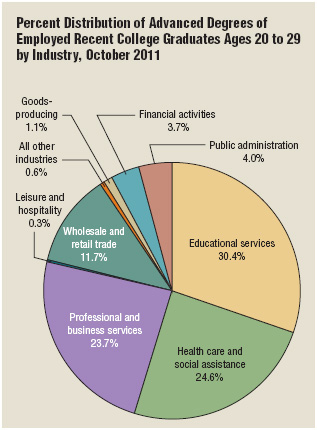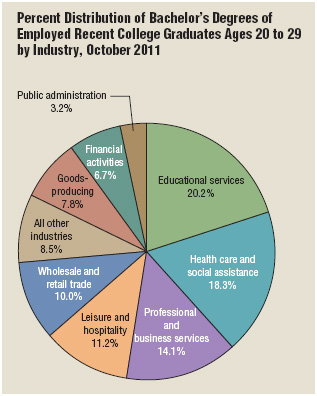How Do I Get a Job if I Have No Work Experience?
When creating a résumé or filling out applications for the first time, you may think that employers will not hire you because you lack prior job experience and have no employers to list as references. Indeed, these factors may rule you out as a candidate for some positions and employers, so focus instead on those who have a proven track record of hiring new graduates or those without industry experience. If you went to college, take advantage of the college's job counseling office or career center, which will often post openings with employers in your area who are willing to hire new graduates. Believe it or not, some employers prefer those with little experience, because it allows them to train you in their own methods and philosophies.

In 2011 the top three job sectors most heavily targeted by recent college graduates with advanced degrees were: (1) Educational Services; (2) Health Care and Social Assistance; and (3) Professional and Business Services. ILLUSTRATION BY LUMINA DATAMATICS LTD. © 2015 CENGAGE LEARNING®. U.S. Bureau of Labor Statistics. “The Job Market for Recent College Graduates in the United States,” The Editor's Desk, April 05, 2013 [online] from http://www.bls.gov/opub/ted/2013/ted_20130405.htm.

In 2011 the top three job sectors most heavily targeted by recent college graduates with bachelor's degrees were Educational Services; Health Care and Social Assistance; and Professional and Business Services, respectively. ILLUSTRATION BY LUMINA DATAMATICS LTD. © 2015 CENGAGE LEARNING®. U.S. Bureau of Labor Statistics. “The Job Market for Recent College Graduates in the United States,” The Editor's Desk, April 05, 2013 [online] from http://www.bls.gov/opub/ted/2013/ted_20130405.htm.
With a little planning, you can increase your employability by maximizing your training and part-time work experiences while completing a degree or vocational program. If you are a college student, part-time jobs can provide opportunities not only to gain needed experience but also to better define career goals. If your goal is to become a landscape architect, working for a landscaper or a nursery over the summer will provide better experience than working for a clothing retailer. Experience working in your vocational school's auto shop, beauty salon, or other job environment will demonstrate your ability to work in these settings after graduation. Asking your part-time job supervisors and teachers to serve as references will also give employers confidence that you are capable of transitioning into a full-time position.
For college students and recent graduates, internships can provide a valuable source of experience that will benefit your job search. Even high school students and sometimes adults lacking job experience or seeking new experiences can apply for internships. The goal of internships is to provide professional and practical experience to students outside of a classroom. In fact, some fields and degrees, such as education, require you to complete an internship before getting a full-time position. After completing an internship, a job seeker may have gained a network of contacts, references, and, in some cases, a job offer.
For both students and adults, volunteering can offer job-related experience. In addition to potentially leading to networking
contacts and a full-time job, it also can bolster skills, improve your sense of community, and provide personal growth. Choose a volunteer position that reflects your career interests in order to enhance skills that will be valuable when you enter the job market. For example, if you want to pursue
a career in education, volunteering in a classroom can help you gain real-world experience that may make you more attractive to employers.
How Can I Demonstrate to Employers That I Will Be an Asset?
You can show employers your value even if you do not have extensive work experience. In addition to the experience and education listed on your résumé, you can mention relevant extracurricular activities such as sports and school clubs and academic awards to demonstrate your suitability for a full-time position. Developing a relationship with a mentor
who can help you expand your skill set, highlight your relevant experiences, and provide insight into your preferred industry will impress employers. Above all, projecting enthusiasm, confidence, and energy during every step of the job search, from requesting an application to interviewing, can make a positive impact on potential employers.

You might consider creating a self-marketing plan. This could entail setting up some informational interviews to learn more about the business and garner a network of contacts. You also can use social media to educate employers about your experience and potential. For example, if you want to become a beautician, you could start a blog about makeup trends or hairstyles. If you want to be a teacher, you could develop lesson plans and post them online. Additionally, you might want to consider signing up for business networking websites such as LinkedIn (https://www.linkedin.com
), which offer you a forum to market yourself and connect with others.
Should I Consider Temporary, Short-Term, or Contract Positions Instead of a Full-Time Job?
Full-time permanent employment is becoming less common than in previous generations, while temporary, short-term, and contract employment is becoming more common than it used to be. While such positions often lack benefits, such as health insurance and vacation pay, they allow you to gain experience and networking contacts. Sometimes these positions can lead to full-time employment.

The hiring process at temporary agencies is often more relaxed than it is for in-house positions. Registering with an agency also gives you latitude; you can specify which days you can or cannot work, how many hours you would like to work, and what locations are most desirable. You can even register with several agencies at once to increase your chance of finding a position that meets your needs. Many businesses use temp agencies as a means of finding permanent employees to hire as well.
What Is It Like Entering the Workforce for the First Time?
Entering the workforce full time is a profound life change. While a day devoted to school and other activities is somewhat flexible, a work environment often is not. You will be required to be on time for work, demonstrate a work-focused attitude, adhere to a schedule imposed by your employer, and complete work-related duties and tasks under a deadline. Some positions are stressful by nature, and most jobs will be taxing as you adjust to their demands.
As a new employee, you must also be aware of workplace policies and issues such as discrimination. Businesses are required to offer information about laws regarding equal opportunity and anti-discrimination policies. You and your coworkers will be held to these standards in your workplace behavior. If the workplace proves to be discriminatory, unsafe, or threatening in any way, you must exercise your rights in a professional manner with a human resources
representative. An inclusive workplace can help increase job satisfaction, an important issue for new employees.
Job satisfaction often depends on factors such as your relationships with coworkers and your manager. Satisfaction can also be determined by job security, the number of vacation and paid holidays you receive, salary and benefits packages, recognition, opportunity for advancement, and the amount of job stress. Few jobs are perfect, and that is especially true for first jobs. With a good attitude and a can-do spirit, however, you will probably not stay at an entry-level position for long.
How Should I Approach Entering the Workforce for the First Time?
As a first-time job seeker, you should draw on all sources of knowledge, support, and networking, including friends and family, to gain the position you desire. You should also be prepared for rejection during the application process and learn not to take it personally. Perseverance obtained during the job search process can prove beneficial after you are hired. After all, your first job search will most likely not be your last.
Always remain professional both during the job search and after being hired. Professionalism refers not only to appropriate attire but also to building trusting relationships with coworkers, management, and executives at your job. It also means being respectful, polite, punctual, and congenial. Finding a mentor, either formally or informally, within your place of employment can be a positive learning experience, helping you to build professional relationships and establishing goals for advancement within the company.